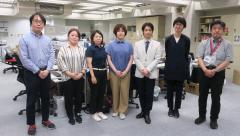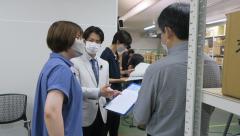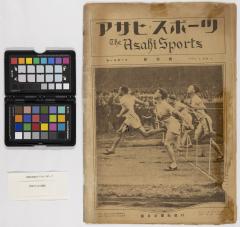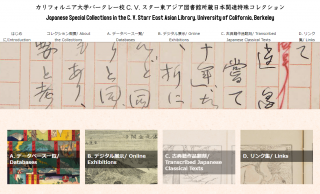-
ARCで若手研究者を育てる:村上佳奈子(秩父宮記念スポーツ博物館・図書館 学芸員)に聞く(※本文は英語です)2022年10月25日(火)
 Murakami san, thank you very much for your time today. Would you please tell us about your time at the Art Research Center (ARC)?
Murakami san, thank you very much for your time today. Would you please tell us about your time at the Art Research Center (ARC)?Murakami: I have very fond memories of the ARC. During my graduate studies at Ritsumeikan University, I could obtain a variety of experiences through my classes, writing my master's thesis, and the internship opportunities in Japan and abroad provided by the ARC.
Within the well-established research environment of the ARC, I could immediately put the knowledge I had obtained in the classroom on digital archiving into practice, the most memorable of which was the filming of the Katayama family's Noh play that I was lucky to participate in.*
Which research area have you specialized in, and why do you find it fascinating?
Murakami: I have specialized in the digital archiving of contemporary Japanese theater.
I have loved theater for years, and because of that, during my undergraduate days, I was doing research on a certain playwright in contemporary theater. However, learning about digital archiving at the ARC, I came to realize that the digital archiving of materials related to contemporary Japanese theater had not progressed that much. So, I chose this as my research theme.
It is so interesting to capture theater, a temporal form of art that cannot be archived in its own right, from the perspective of its related materials.
What did you experience during your internship abroad, and what are your thoughts on it?
Murakami: I was very fortunate that I could do my internship training at the University of California, Berkeley, for a week as part of my graduate course, as the ARC has been closely collaborating with the university for many years.
Under the guidance of the librarian in charge of the Japanese collection at the C.V. Starr East Asian Library, we worked on the Virtual Institute of the 'Japanese Special Collections in the C.V. Starr East Asian Library, University of California, Berkeley' created in collaboration with the ARC. We also got an opportunity to talk to librarians in other departments at the library as well as staff in charge of digital archiving.
Nowadays, the ability to communicate in English, in particular, conveying your own ideas, is essential in order to study, network, and conduct research abroad. Therefore, I am thankful that the ARC facilitated our internship opportunity at UC Berkeley and provided an environment for us to actively engage in English conversations without worrying about making mistakes.
Can you tell us about your current job?
Murakami: I work as a curator at the Prince Chichibu Memorial Sports Museum in Tokyo and am mainly in charge of its digital archiving projects. I am glad I can utilize my knowledge acquired at the ARC for my current digital archiving duties by leading a joint research project with the ARC and discussing plans for the digital archiving of materials in the museum collection.

I have been researching how to do digital archiving of a wide variety of materials related to sports. After all, sports are something that almost everyone experiences, so depending on the angle you take, it would be easy to attract people's interests, which is quite rewarding.
Can you tell us more about the joint research project with the ARC and the significance of this project?
Murakami: The joint digital archiving project encompasses all kinds of sports materials in our museum collection--from three-dimensional materials such as athletic equipment, medals, and uniforms to paper materials such as books and newspapers on sports, and documents on tournament management.

Although most of the materials are from Japan, there are also many books in foreign languages, and documents on foreign athletes and overseas competitions.
In the study of sports, research on so-called 'sports science' has been quite advanced. Yet, research on the cultural aspect has not been as extensive. Hence, our joint research project to construct a digital archive on sports materials aims to further develop the study of sports as an activity of the people and society.
What do you hope to achieve with this joint research project?
Murakami: Our goal is to leverage the ARC digital archiving system to eventually digitize all of the museum's materials and build a digital archive on sports that will facilitate collaboration with other institutions as well.
We hope to release our database in 2025 and make all those items with no issues regarding copyrights available to the general public.
___________________________________
*The ARC has been closely working with the Katayama Family Foundation for the Preservation of Noh and Traditional Kyoto Dance (片山家能楽・京舞保存財団/ https://www.arc.ritsumei.ac.jp/k-kanze/ ) to film and digital archive their performances for more than 20 years.
(This interview was conducted by Yinzi Emily Li.)














